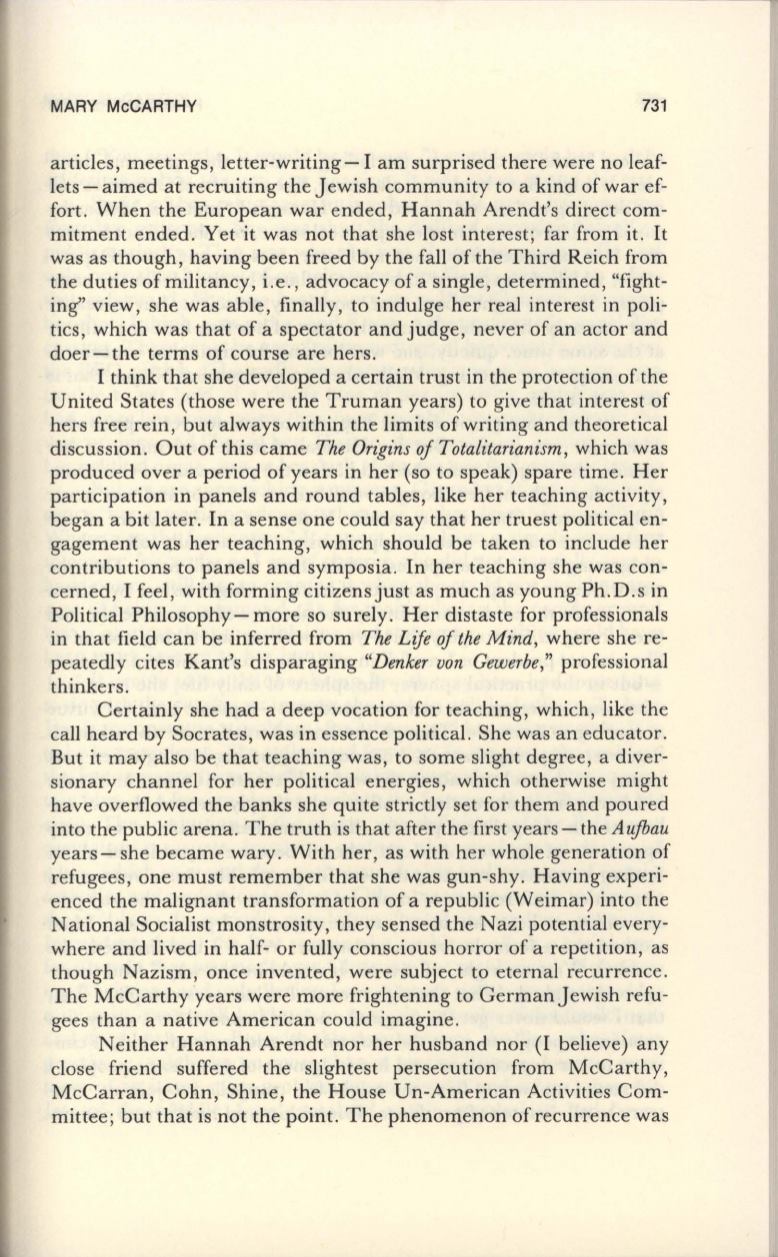
MARY McCARTHY
731
articles, meetings , letter-writing-! am surprised there were no leaf–
lets- aimed at recruiting the Jewish community to a kind of war ef–
fort. When the European war ended, Hannah Arendt's direct com–
mitment ended. Yet it was not that she lost interest; far from it.
It
was as though, having been freed by the fall of the Third Reich from
the duties of militancy, i.e., advocacy of a single, determined, "fight–
ing'' view, she was able, finally, to indulge her real interest in poli–
tics, which was that of a spectator and judge, never of an actor and
doer- the terms of course are hers.
I think that she developed a certain trust in the protection of the
United States (those were the Truman years) to give that interest of
hers free rein, but always within the limits of writing and theoretical
discussion. Out of this came
The Origins of Totalitarianism,
which was
produced over a period of years in her (so to speak) spare time. Her
participation in panels and round tables, like her teaching activity,
began a bit later. In a sense one could say that her truest political en–
gagement was her teaching, which should be taken to include her
contributions to panels and symposia. In her teaching she was con–
cerned, I feel, with forming citizens just as much as young Ph .D .s in
Political Philosophy- more so surely. Her distaste for professionals
in that field can be inferred from
The Life of the Mind,
where she re–
peatedly cites Kant's disparaging
"Denker von Gewerbe,"
professional
thinkers.
Certainly she had a deep vocation for teaching, which, like the
call heard by Socrates, was in essence political. She was an educator.
But it may also be that teaching was, to some slight degree, a diver–
sionary channel for her political energies, which otherwise might
have overflowed the banks she quite strictly set for them and poured
into the public arena. The truth is that after the first years- the
Aufbau
years- she became wary. With her, as with her whole generation of
refugees, one must remember that she was gun-shy . Having experi–
enced the malignant transformation of a republic (Weimar) into the
National Socialist monstrosity, they sensed the Nazi potential every–
where and lived in half- or fully conscious horror of a repetition, as
though Nazism, once invented, were subject to eternal recurrence.
The McCarthy years were more frightening to German jewish refu–
gees than a native American could imagine.
Neither Hannah Arendt nor her husband nor (I believe) any
close friend suffered the slightest persecution from McCarthy,
McCarran, Cohn, Shine, the House Un-American Activities Com–
mittee; but that is not the point. The phenomenon ofrecurrence was


